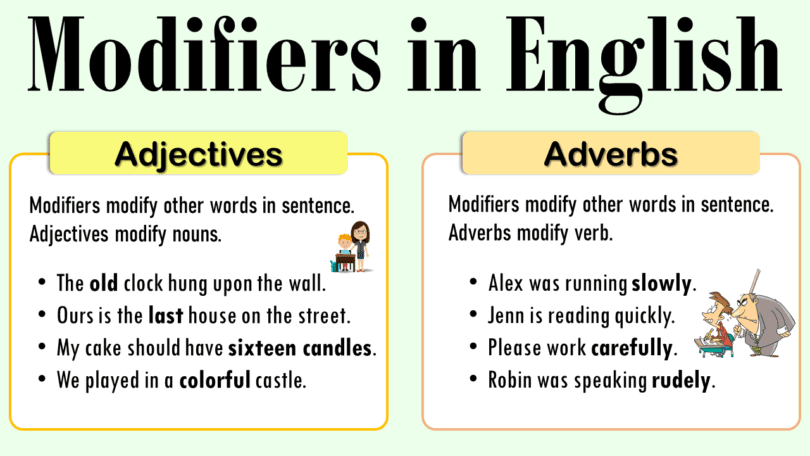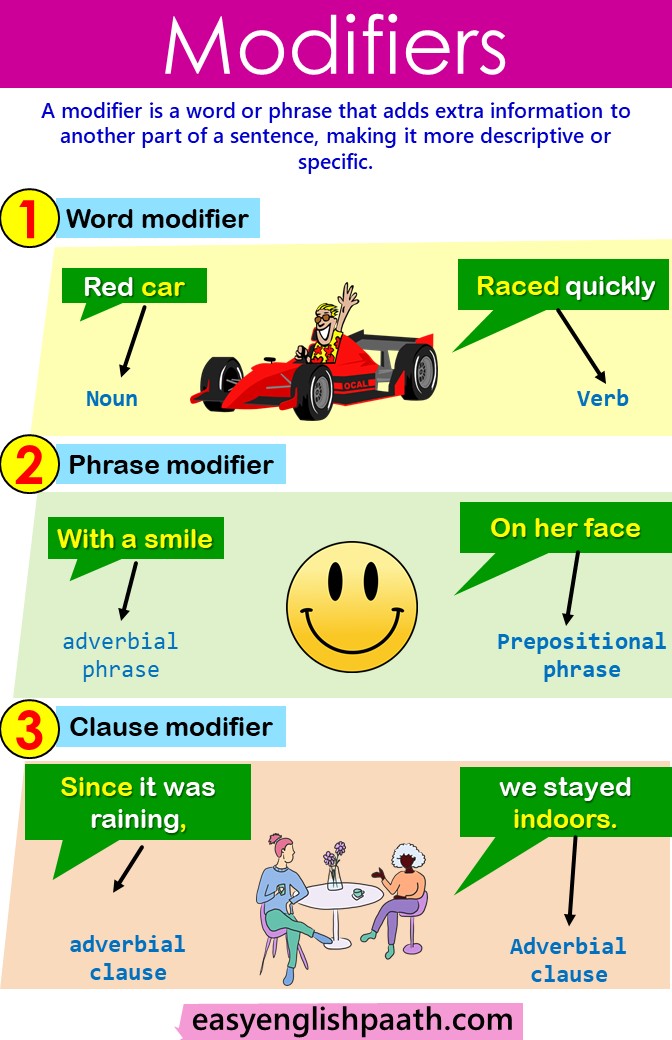Modifiers are words or phrases that provide additional information about another word in a sentence. They help make sentences more descriptive and precise. Modifiers can describe nouns, verbs, adjectives, and even entire clauses, enhancing clarity and meaning. Understanding modifiers is essential for constructing clear and grammatically correct sentences.
What are Modifiers?
Modifiers are words or phrases that are used to provide more information about another word in a sentence. They modify or describe nouns (adjective modifiers) or verbs (adverb modifiers).
Types of Modifiers
1. Adjective Modifiers
Adjective modifiers describe nouns by providing extra details about their quality, quantity, or characteristics. They answer the questions “What kind?” or “Which one?”
- The blue car is parked outside.
- An expensive restaurant opened nearby.
In these examples, “blue” and “expensive” describe the nouns “car” and “restaurant,” respectively.
2. Adverb Modifiers
Adverb modifiers describe verbs, adjectives, or other adverbs by answering questions like “How?” “When?” “Where?” or “To what extent?”
- He ran quickly to catch the bus.
- She speaks very softly.
Here, “quickly” modifies “ran,” showing how he ran, and “very” modifies “softly,” emphasizing the degree.
3. Noun Modifiers
Noun modifiers are words or phrases that modify nouns and often act like adjectives.
- The college professor gave an interesting lecture.
- He bought a leather jacket.
“College” and “leather” act as modifiers for “professor” and “jacket,” specifying the type.
4. Verb Modifiers
Verb modifiers provide additional details about actions in a sentence.
- She sings beautifully on stage.
- He spoke quietly in the meeting.
In these sentences, “beautifully” and “quietly” modify the verbs “sings” and “spoke,” respectively.
5. Prepositional Phrases
Prepositional phrases begin with a preposition (in, on, at) and end with a noun or pronoun. They act as modifiers by showing location, time, direction, or manner.
- He is sitting on the chair.
- The book is under the table.
6. Participial Phrases
Participial phrases include a participle (verb ending in -ing or -ed) and function as adjective modifiers.
- The burning candle lit up the room.
- She saw a girl, crying in the park, and comforted her.
7. Infinitive Phrases
Infinitive phrases consist of “to” + a verb and act as adjective or adverb modifiers.
- She gave me a book to read.
- He works hard to succeed.
8. Relative Clauses
Relative clauses provide extra information about a noun and start with who, which, or that.
- The cat that is black is mine.
- The book, which is on the shelf, is a bestseller.
9. Appositives
Appositives rename or explain a noun within a sentence.
- My friend Sarah is a doctor.
- The car, a shiny red convertible, caught everyone’s attention.
Common Modifier Mistakes
1. Dangling Modifiers
A dangling modifier occurs when the word it is supposed to describe is missing from the sentence.
❌ Walking to the store, the rain began.
✅ Walking to the store, Ali saw the rain begin.
2. Squinting Modifiers
A squinting modifier is placed between two words, causing confusion about which word it modifies.
❌ I only told her yesterday.
✅ I told only her yesterday.
3. Misplaced Modifiers
A misplaced modifier is too far from the word it modifies, creating ambiguity.
❌ She served sandwiches to the children on paper plates.
✅ She served sandwiches on paper plates to the children.
Dangling Modifiers, vs Squinting Modifiers, and Misplaced Modifiers
| Type of Modifier | Definition | Common Mistake | Corrected Example |
|---|---|---|---|
| Dangling Modifier | A modifier that does not have a clear subject in the sentence. | ❌ Walking to the store, the rain began. (It seems like the rain is walking!) | ✅ Walking to the store, Ali saw the rain begin. (Now it’s clear that Ali is walking.) |
| Squinting Modifier | A modifier placed between two words, making it unclear which one it describes. | ❌ I only told her yesterday. (Does “only” modify “told” or “yesterday”?) | ✅ I told only her yesterday. (Now it’s clear that she was the only one told.) |
| Misplaced Modifier | A modifier that is too far from the word it modifies, leading to confusion. | ❌ She served sandwiches to the children on paper plates. (Were the children on paper plates?) | ✅ She served sandwiches on paper plates to the children. (Now it’s clear that the sandwiches were on plates.) |
Example Sentences with Modifiers
- The tall building stood in the middle of the city.
- She sang beautifully at the concert.
- The math teacher assigned a difficult problem.
- He completed his work quickly and left early.
- The book on the shelf belongs to Ahmed.
- Laughing loudly, the children ran through the park.
- She bought a new laptop to finish her project.
- The dress that she wore was stunning.
- After eating dinner, Ali went for a walk.
- He saw a dog with a fluffy tail in the park.
FAQs About Modifiers
1. What is a modifier in English grammar?
A modifier is a word or phrase that adds information to a sentence by describing nouns, verbs, adjectives, or adverbs. Examples include adjectives, adverbs, prepositional phrases, and relative clauses.
2. What is the difference between an adjective modifier and an adverb modifier?
- Adjective modifiers describe nouns (The red apple is sweet).
- Adverb modifiers describe verbs, adjectives, or other adverbs (She sings beautifully.).
3. How do you fix a dangling modifier?
To fix a dangling modifier, rewrite the sentence so that the subject being modified appears clearly.
❌ After studying hard, the test was easy.
✅ After studying hard, Ahmed found the test easy.
4. Can a noun modify another noun?
Yes, noun modifiers exist when one noun modifies another.
- The coffee shop is open 24/7.
- She wore a gold necklace.
You May Also Like






